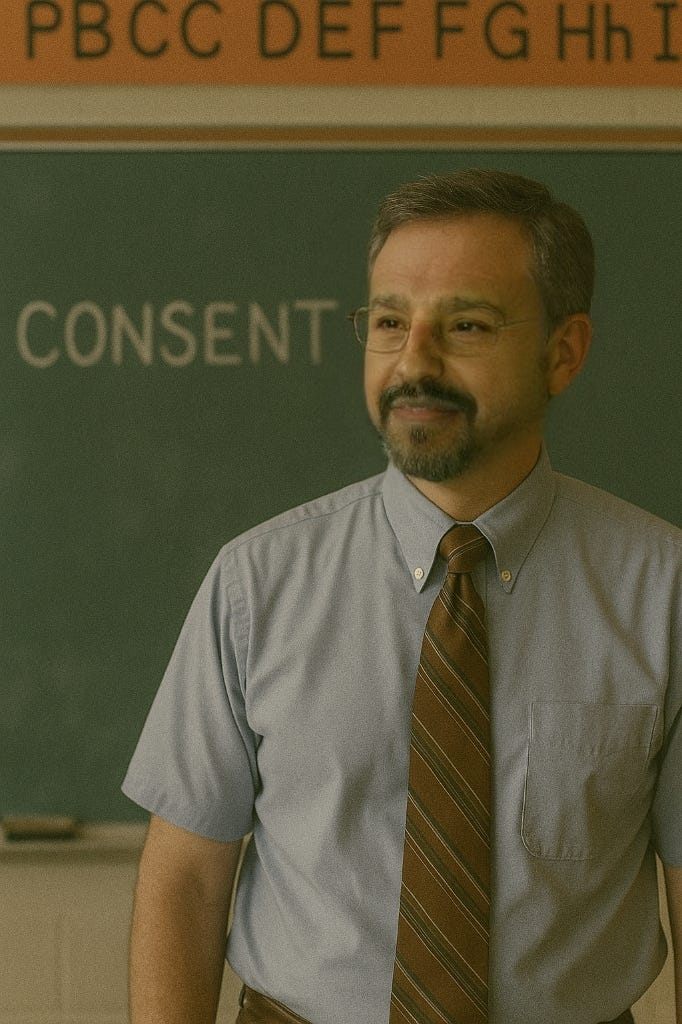After twenty-five years in public education—two and a half decades of bells, binders, budget crises, and bathroom passes—you’d think I’d have earned the right to call myself one of the good guys. I mean, I’ve given speeches about equity. I’ve read Pedagogy of the Oppressed more than once (and quoted it with feeling). I’ve sat through all the workshops with acronyms that sound like dystopian sci-fi villains: MTSS, PLC, PBIS. I’ve mentored struggling students, hugged sobbing parents, and nodded through twelve different cycles of “Common Core math.”
But lately, in the dark hours of early morning, when the Keurig coughs and sputters like a sickly oracle, I’ve come to a troubling realization. I am the machine.
Or, to be more precise, I am in the machine. Maybe even a bit of the grease. Possibly the clipboard. Certainly, the guy handing out worksheets that ask kids to circle the main idea. And what is the main idea? It’s that schooling—our beloved, underfunded, over-regulated, good-intentioned schooling—isn’t just a site of learning. It’s a factory for the production of consent.
Now, before you go reporting me to the superintendent (again), let’s define terms. When I say “consent,” I don’t mean permission slips or awkward talks about the birds and bees. I mean the Chomsky-type consent—the deep, quiet agreement to accept the world as it is. To color inside the lines. To raise your hand before speaking. To value the gold star over the golden question.
School: The Original Panopticon (With Pep Rallies)
Let’s be honest. School has always been a warm-up act for society’s grand show of norms. We start with finger painting and end with FAFSA forms, but the throughline is control. Sit. Listen. Regurgitate. Be nice. Don’t question the rubric. And if you do, phrase it as an “inquiry,” not a “rebellion.”
The desks are in rows. The bells are loud. The curriculum is pre-chewed. The schedule mimics the adult workday so perfectly that you’d think the ultimate learning goal is punctual mediocrity. Is this where innovation lives? Or where it goes to die politely?
Even the much-beloved student government is a parody of democracy. What exactly is being governed? The spirit week dress code? The theme of the spring dance? It's all training—adorable, glitter-covered training—for later in life when your vote will be counted equally with a billionaire’s and your protest will be corralled behind a chain-link fence.
The Educator as Complicit Prophet
Here’s the real kicker: we educators know this. We know. At some point in our careers—probably during our second year, right after the laminator broke and before the copier caught fire—we realized that we weren’t leading revolutions. We were managing expectations.
And yet, we stay. We lean in. We get passionate about formative assessments. We clap for student-led conferences like they’re TED Talks. We build bulletin boards about growth mindset and grit, all the while knowing that the system still punishes the child who dares to say, “This seems pointless.”
So why do we do it? Well, some of us believe we can change it from within. (Ha!) Some of us need the paycheck. (Double ha!) And some of us are just too far in to admit that maybe we’ve been replicating a form of soft tyranny this whole time. We are not the resistance. We are the franchise owners.
But I Still Believe
Here’s the twist: I still love public education. I do. Not because it's perfect. Not because it's just. But because it is one of the only places left where something unexpected can happen.
Even in this factory of consent, every so often, a student will ask a question so good it echoes. A teacher will throw out the lesson plan and just talk. A kid will write a poem that punches you in the heart. There are cracks in the walls of this machine, and through those cracks, sunlight gets in.
The truth is, I no longer see public education as a battle between the good guys and the bad guys. It’s a haunted house we all live in. Some of us decorate. Some of us sweep the floors. And some of us—guilty as charged—have become part of the architecture.
But even haunted houses can be remodeled.
So yes, I am the man. I am the evil that men do. I hand out rubrics like dogma and anchor charts like scripture. But I also hide strange ideas in the margins of handouts. I ask dangerous questions during staff meetings. I wink when a student challenges authority with style.
Because deep down, I still believe in learning. I still believe in kids. I even still believe in schools.
But maybe it’s time to stop producing so much consent.
And start producing a little more beautiful, generative, exhilarating dissent.








